In the enchanting world of avian companionship, Macaws stand out as vibrant and intelligent feathered friends. However, amidst their striking plumage and charismatic personalities, a concerning health issue looms – Macaw Asthma.
This phenomenon, akin to asthma in humans, manifests as respiratory distress in these magnificent birds, posing a significant threat to their well-being.
As caregivers and enthusiasts of these majestic creatures, understanding the intricacies of Macaw Asthma becomes paramount.
This article delves into the causes, symptoms, and potential remedies associated with Macaw Asthma in birds, shedding light on the challenges faced by these avian beings.
By unraveling the mysteries of this respiratory affliction, we aim to empower bird lovers with the knowledge to safeguard the health and happiness of their cherished Macaw companions.
Join us on this exploration of Macaw Asthma, where awareness transforms into compassionate care.
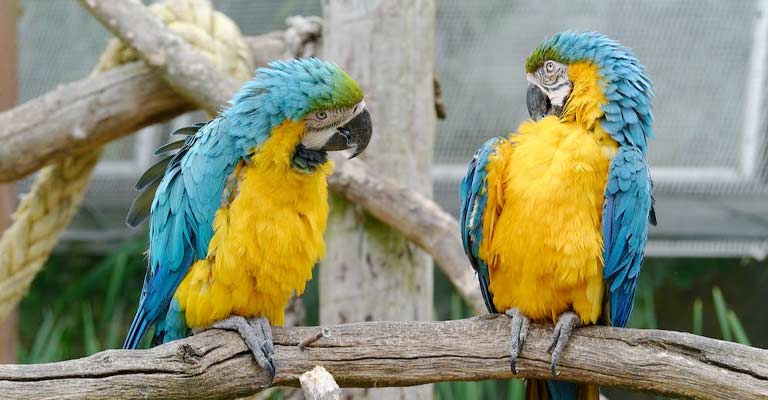
Macaw Asthma in Birds
Macaw Asthma, also known as air sacculitis or chronic respiratory disease, primarily affects the respiratory system of these avian beings.
The condition arises when the air sacs, crucial components of a bird’s respiratory anatomy, become inflamed or infected. This inflammation leads to breathing difficulties, wheezing, and other respiratory distress symptoms.
Causes of Macaw Asthma
Several factors contribute to the development of Macaw Asthma. Environmental stressors, such as exposure to dusty or polluted air, can trigger respiratory issues in Macaws.
Additionally, inadequate nutrition, particularly a diet lacking essential nutrients, may compromise their immune system, rendering them more susceptible to respiratory ailments. Here are the details:
Environmental Factors
One significant contributor to Macaw Asthma is exposure to environmental stressors. Macaws are particularly sensitive to airborne particles, dust, and pollutants.
Dust from bedding materials, feathers, and other environmental elements can irritate their respiratory system, leading to inflammation of the air sacs.
Owners should take precautions to minimize dust exposure by using clean bedding, employing air purifiers, and ensuring proper ventilation in the bird’s living space.
Poor Air Quality
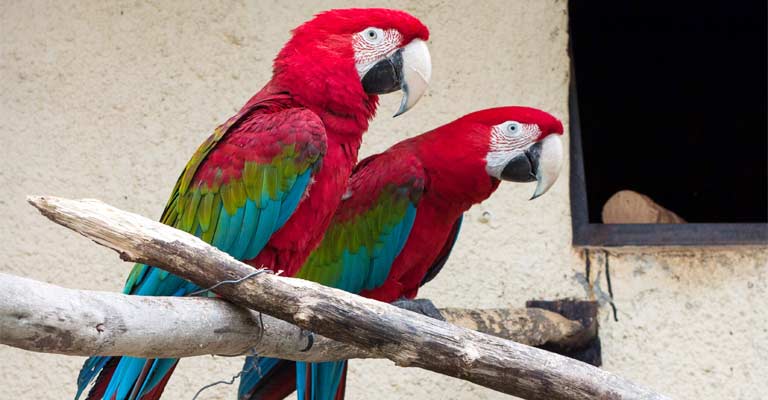
Inadequate air quality is a common trigger for respiratory issues in Macaws. Birds have a highly efficient respiratory system, but when exposed to poor air conditions, their delicate air sacs can become compromised.
Cigarette smoke, aerosol sprays, and other air pollutants pose a risk to their respiratory health. Maintaining a smoke-free environment and avoiding the use of aerosol products around Macaws are essential steps in preventing respiratory distress.
Nutritional Imbalances
A well-rounded and balanced diet is crucial for overall avian health. Macaws with nutritional deficiencies, particularly in essential vitamins and minerals, are more susceptible to respiratory issues.
Imbalances in their diet can compromise their immune system, making them prone to infections and respiratory distress. Providing a nutritionally sound diet that includes a mix of fruits, vegetables, and high-quality pellets is vital in preventing Macaw Asthma.
Bacterial and Fungal Infections
Macaw Asthma can be triggered by bacterial or fungal infections affecting the respiratory system. These infections can originate from contaminated food, water, or exposure to other sick birds.
Owners must maintain strict hygiene practices, ensuring that food and water containers are regularly cleaned and sanitized. Additionally, isolation of sick birds and prompt veterinary attention are essential in preventing the spread of infections.
Allergens
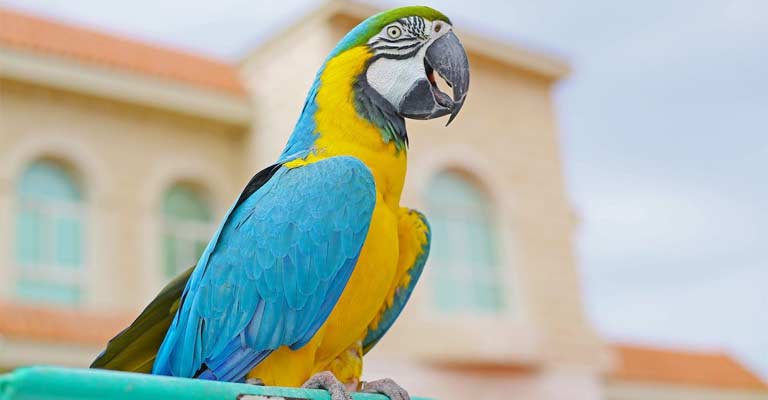
Macaws, like humans, can be sensitive to allergens that may provoke respiratory reactions. These allergens can include pollen, feathers, and certain types of bedding.
Identifying and minimizing exposure to potential allergens is crucial in managing and preventing allergic reactions that could contribute to the development of Macaw Asthma.
Stress and Anxiety
Psychological factors, such as stress and anxiety, can impact the health of Macaws. Birds experiencing chronic stress may be more susceptible to respiratory issues. Stressors can include changes in the environment, the presence of predators or other pets, or disruptions in their routine.
Providing a secure and stimulating living environment, along with positive interactions, helps reduce stress and supports overall respiratory well-being.
Genetic Predisposition h4
Some Macaws may be genetically predisposed to respiratory conditions. While genetics alone may not cause Macaw Asthma, it can influence an individual bird’s susceptibility to respiratory issues.
Breeders and caregivers should be aware of the genetic history of Macaws to make informed decisions regarding their care and potential health risks.
What Are the Symptoms of Macaw Asthma?
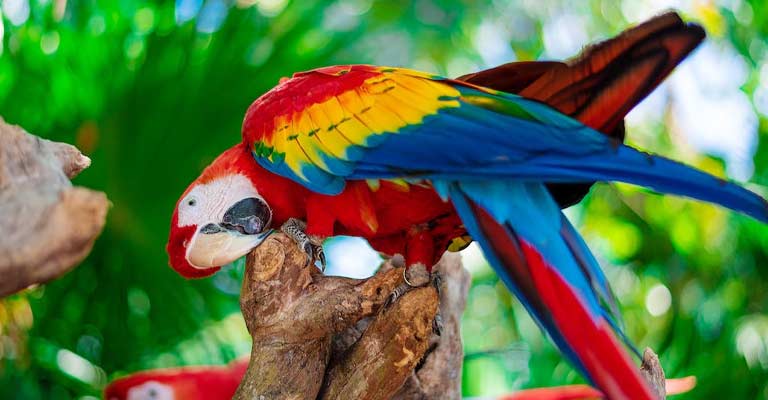
Identifying the symptoms of Macaw Asthma is crucial for early intervention. Watch for signs such as labored breathing, nasal discharge, coughing, sneezing, and lethargy.
Labored Breathing
One of the primary indicators of Macaw Asthma is labored breathing. Affected birds may exhibit rapid, shallow breaths, or visibly struggle to breathe. This can be observed as increased movement of the chest and abdominal regions during respiration.
Nasal Discharge
Macaws with respiratory distress may develop a nasal discharge. Keep an eye out for any unusual discharge from the nostrils, which can range from clear to discolored and may be accompanied by sneezing.
Coughing and Wheezing
Persistent coughing and wheezing are common signs of respiratory issues, including Macaw Asthma. These audible respiratory sounds indicate inflammation or irritation of the airways and should be promptly addressed.
Changes in Vocalization
Birds experiencing respiratory distress may exhibit changes in vocalization. A Macaw with Asthma might sound different than usual, with alterations in pitch, volume, or frequency of vocalizations.
Lethargy and Decreased Activity
Respiratory issues can lead to fatigue and decreased energy levels in Macaws. If you notice a significant decrease in your bird’s activity, reluctance to play, or a general lack of interest in its surroundings, it could be indicative of an underlying respiratory problem.
Tail Bobbing
Abnormal tail movements, particularly noticeable bobbing or pumping, may occur as the bird attempts to compensate for respiratory difficulties. This behavior is a clear indication that the bird is working harder to breathe.
Weight Loss
Chronic respiratory conditions can impact a bird’s overall health, potentially leading to weight loss. Monitor your Macaw’s weight regularly, as sudden or unexplained weight loss may be linked to underlying respiratory issues.
Sleeping with Open Mouth
An open-mouthed breathing posture during rest or sleep is abnormal in Macaws and may signify respiratory distress. If your bird consistently sleeps with its beak open, it warrants immediate attention.
Respiratory issues can affect a bird’s appetite. A noticeable decrease in food consumption or a reluctance to eat may be an early sign of Macaw Asthma.
How to Treat Macaw Asthma in Birds?
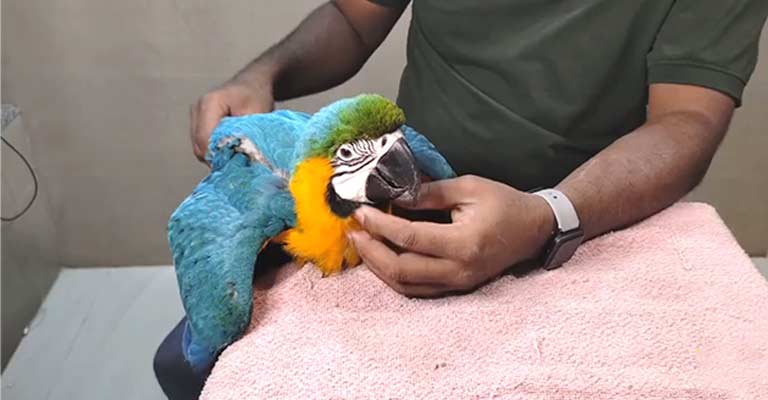
Treating Macaw Asthma in birds involves a comprehensive approach that addresses both the symptoms and underlying causes. Here are key steps and considerations for managing and treating Macaw Asthma:
Veterinary Consultation
Seek immediate veterinary attention for an accurate diagnosis and treatment plan. An avian veterinarian will conduct a thorough examination, possibly including X-rays, blood tests, and endoscopy, to assess the extent of respiratory distress and identify potential causes.
Medication
Depending on the severity and underlying cause of Macaw Asthma, your veterinarian may prescribe medications to alleviate symptoms and target specific issues.
These may include antibiotics for bacterial infections, antifungals for fungal issues, or anti-inflammatory drugs to reduce airway inflammation.
Environmental Adjustments
Create an environment that supports respiratory health. Minimize exposure to potential irritants such as dust, smoke, and pollutants.
Use air purifiers, maintain proper ventilation, and keep the living space clean to reduce airborne particles that can exacerbate respiratory distress.
Nutritional Support
Ensure your Macaw receives a well-balanced and nutrient-rich diet. Consult with your veterinarian to tailor a diet that addresses specific nutritional needs and supports overall health, including the respiratory system. Adequate hydration is also crucial for birds with respiratory issues.
Humidity Control
Maintain optimal humidity levels in your Macaw’s environment. Too much or too little humidity can impact respiratory health. Consult with your veterinarian to determine the appropriate humidity range for your bird’s well-being.
Isolation of Sick Birds
If you have multiple birds, consider isolating the affected bird to prevent the potential spread of infections. This is particularly important if the underlying cause of Macaw Asthma is infectious.
Stress Reduction
Minimize stressors in your Macaw’s life. Provide a secure and stimulating environment, and avoid sudden changes or disturbances. Reducing stress can contribute to the overall well-being and resilience of birds with respiratory conditions.
Follow-Up Veterinary Care
Regular follow-up appointments with your avian veterinarian are essential to monitor progress and adjust the treatment plan as needed. Your veterinarian may recommend additional tests or modifications to the treatment protocol based on your Macaw’s response.
FAQs
What are the common symptoms of Macaw Asthma in birds?
Symptoms of Macaw Asthma include labored breathing, nasal discharge, coughing, wheezing, changes in vocalization, lethargy, tail bobbing, weight loss, open-mouthed breathing during rest, and decreased appetite.
How is Macaw Asthma diagnosed by veterinarians?
Veterinarians diagnose Macaw Asthma through a thorough examination, including X-rays, blood tests, and endoscopy. These diagnostic tools help assess respiratory distress and identify potential causes, leading to an accurate treatment plan.
Can Macaw Asthma be treated at home, or is veterinary care necessary?
Veterinary care is essential for treating Macaw Asthma. Home treatments, such as environmental adjustments and a balanced diet, can support overall health, but a veterinarian is crucial for accurate diagnosis and prescription of medications tailored to the specific needs of the bird.
Are there preventive measures to avoid Macaw Asthma?
Yes, preventive measures include maintaining a clean living environment, minimizing exposure to dust and pollutants, providing a balanced and nutritious diet, regular veterinary check-ups, and promptly addressing any signs of respiratory distress. These measures contribute to the prevention of Macaw Asthma.
Can Macaw Asthma be cured, or is it a lifelong condition?
While Macaw Asthma can be managed with proper veterinary care, it may not be completely cured. Treatment aims to alleviate symptoms, address underlying causes, and maintain the bird’s respiratory health. Continuous monitoring, follow-up veterinary care, and preventive measures are crucial for long-term well-being.
Conclusion
The journey through the realm of Macaw Asthma underscores the importance of vigilance and education in avian care.
As we navigate the delicate intricacies of respiratory health in these captivating birds, the significance of early detection and proactive measures becomes evident.
Whether it’s understanding environmental triggers, implementing appropriate dietary considerations, or seeking timely veterinary intervention, the well-being of Macaws hinges on the commitment of their human caretakers.
In our collective efforts to unravel the complexities of Macaw Asthma in birds, we pave the way for a future where these majestic creatures can thrive in an environment that prioritizes their respiratory health.
Let this exploration serve as a call to action, urging us all to be steadfast guardians of the respiratory vitality that ensures the enduring vibrancy of our cherished Macaws.
Together, we can create a world where these majestic birds soar with unhindered breath, embodying the true essence of avian well-being.